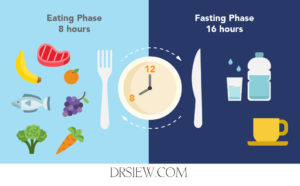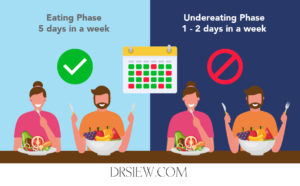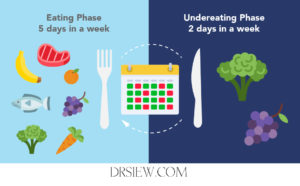
Weight-loss diets – a love-hate relationship for dieters. Ranging from Paleo, Vegan, Dukan, Low-carb, Atkins, the list of diets which claim to help you lose weight the fastest goes on. Intermittent fasting, one of the more popular dieting options, is not something new. Historically, fasting has been used in religion for centuries. The Daniel fast is a biblical partial fast that is typically undertaken for 3 weeks, and during the Ramadan month in the Muslim calendar, Muslims worldwide practice fasting during daylight hours where it is considered as one of the five main pillars of their religion, Islam.[1] However, in today’s modern context, what are the ways to practice intermittent fasting, and are there any significant health benefits? Read on to find out more.
What is Intermittent Fasting?
Rather than restricting the foods you eat, intermittent fasting is a cycle between periods of fasting and eating. It is more crucial to control when you eat, as opposed to what you eat. Various ways to practice intermittent fasting[2] include:
a) The 16/8 method: Involves skipping breakfast and restricting your daily eating period to eight hours, and subsequently fasting for the remaining 16 hours of the day.
b) The eat-stop-eat method: Involves 24-hour fasts once or twice per week on non-consecutive days.
c) The 5:2 diet: On two non-consecutive days of the week, you restrict your intake to 500–600 calories. You do not restrict intake on the five remaining days.
d) The Warrior Diet: Eat small amounts of raw fruits and vegetables during the day and one huge meal at night.

Health Benefits of Intermittent Fasting
While most of research to support the health benefits of fasting have been conducted on animals and not humans, the results have been promising. Instead of a diet, intermittent fasting is seen as regulating the timing of your eating pattern. As such, some have claimed that it is less restrictive, less calorie-counting and therefore, an easier way to lose weight in the longer term.
However, one should be mindful that weight loss is possible because one eats fewer calories overtime, provided this is not overcompensated by eating much more unhealthy foods during the eating periods. In addition to body weight loss of up to 9%, statistics have shown that fasting can reduce overall body fat and improve blood lipids to achieve a lower blood pressure (approximately 5%-20% reduction in total cholesterol and 17%-50% reduction in triglycerides).[3] Fasting may also limit inflammation, improve biomarkers of disease, reduce oxidative stress and preserve learning and memory functioning.[4]

Are There any Cons to Intermittent Fasting?
Like any other diet, intermittent fasting may be a fad — which means it may be only popular only for a short period of time. more research is needed before we can clearly tell if there are any long time detrimental problems to our bodies.
Another concern is that intermittent fasting will perhaps unintentionally, encourage extreme behaviour, such as bingeing, so compensate for not eating during the fasting periods. The misunderstanding is that if you fast two days a week, you can devour as much junk as your gullet can swallow during the remaining five days, which is not true.[5]
I have several friends who have tried the diet – some swear by it while others found that it did not work well. Anecdotally, the ones who did not watch what they ate during the non-fasting hours were more often the ones who did not find the diet useful.

What Might be a More Sustainable Weight Loss Method?
In a nutshell, it is important to remember that weight loss occurs when the overall energy output is more than the calorie intake, over a sustained duration. Imagine if one had piled on unhealthy carbohydrates and fried foods like fritters and French fries, sweet treats like cakes and cola during the allowed period of eating, it would not be possible to lose weight, body fat and total cholesterol.
In Freedland’s article, he echoes that “to improve health, the goal should be to lose weight by reducing the total amount of calories consumed, rather than focusing on when those calories are consumed. If you [don’t] eat two days a week, and limit what you eat the other five days, you will lose weight. It’s one approach to losing weight, (but) I’m not sure it works any better than cutting down slightly seven days a week.”[6]
To have a healthier body in the longer term, we should advocate eating from all the major food groups- wholemeal carbohydrates, lean protein, vegetables and fruits- in accordance with the diet pyramid/ food guide. Moderate indulgence of treats is also encouraged, so that the body is not deprived; keeping in mind, of course, that exercise should also be key.
Lastly, if you are considering the extra boost to achieving a more ideal silhouette, you can speak to your doctor about how body contouring treatments such as Cryolipolysis (also known widely as Fat Freezing) can help you!

References:
[1]https://www.ncbi.nlm.nih.gov/pmc/articles/PMC4257368/
[2] https://www.healthline.com/nutrition/9-weight-loss-diets-reviewed#section9
[3] https://www.ncbi.nlm.nih.gov/pubmed/26374764
[4] https://www.ncbi.nlm.nih.gov/pmc/articles/PMC4257368/
[5]https://www.ncbi.nlm.nih.gov/pmc/articles/PMC3680567/
[6]https://www.ncbi.nlm.nih.gov/pmc/articles/PMC3680567/#!po=21.4286
[7]https://radium-aesthetics.com/aesthetic-treatments/#1477654899190-fa03ee23-3f1684c0-0e82


















thanks for sharing your thoughts about diet and weight loss. I appreciate it